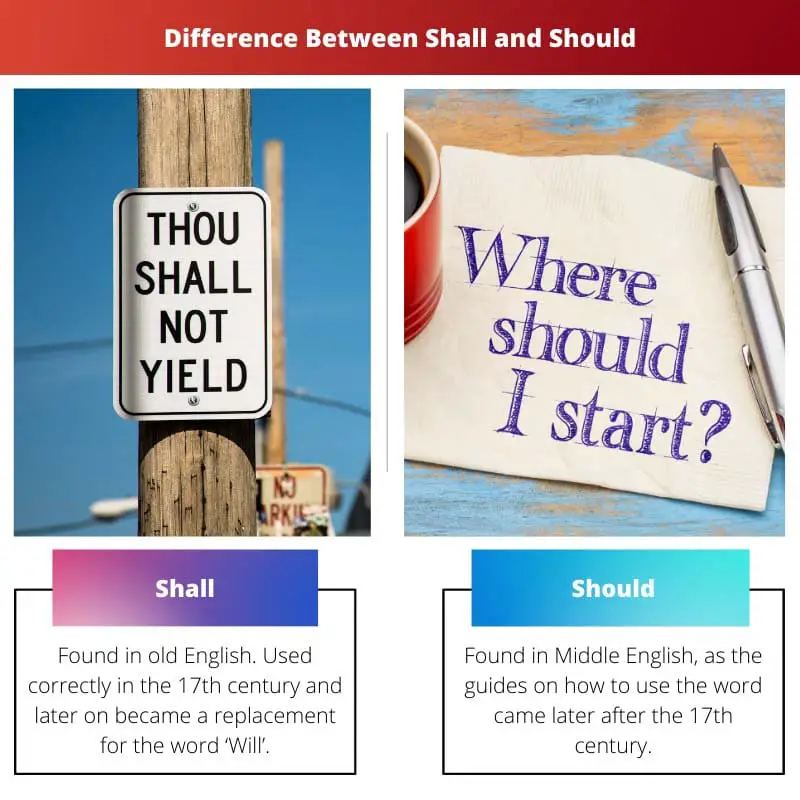The words ‘Shall’ and ‘Should’ are related because ‘Should’ is the past tense of ‘Shall,’ but they cannot be used in place of each other, as their meaning changes with the sentence structure.
Key Takeaways
- “Shall” is a modal auxiliary verb used to indicate future actions or intentions, especially in formal or legal contexts, while “should” is a modal auxiliary verb used to express advice, recommendations, or conditional situations.
- “Shall” is more commonly used in British English to denote obligation or necessity, while “should” is preferred in American English and has a wider range of uses across different contexts.
- Both “shall” and “should” can be used to convey obligation, but “should” carries a softer tone and is more frequently used in everyday speech.
Shall vs. Should
The difference between Shall and Should is that the former tells us that an event will occur with certainty, while the latter assures us that it might happen.

The word ‘Shall’ is used when the general sentence wishes to convey something that will take place in the future. The term is also a replacement for the word ‘will.’
The word ‘Should’ is more of an advisory term and commonly conveys something or an event that must take place or already has taken place.
Comparison Table
| Parameters of Comparison | Shall | Should |
|---|---|---|
| Derivation | Found in old English. Used correctly in the 17th century and later became a replacement for the word ‘Will.’ | Found in Middle English, the guides on how to use the word came later after the 17th century. |
| Grammatical form | The word is a modal verb that accompanies first, second, and third-person pronouns and forms a future tense. | It is a modal auxiliary verb. The basic structure is “Subject + Auxiliary verb + Main verb.” |
| Purpose | They are used to express ideas and rules and when a speaker wishes to convey something that will take place in the future. | It is used to give advice or recommend something. It also can be used to express personal opinions or desires. |
| Example | “Looking at how hard Ravi is studying, I know he shall make this family proud one day.” | “Rather than poking at the wound, you should apply some ointment and bandages.” |
| Tense and writing format | Used in formal writing and expresses future tense. | Used in informal writing mainly, and as the past tense of ‘Shall.’ |
When to Use Shall?
The word was first used in Old English as ’shal,’ and later in the 17th century, with the help of newly formed guides, ‘shall’ became a replacement word for ‘Will’ that is to be accompanied by first, second, and third-person pronouns.
The word ‘shall’ is a modal verb whose purpose varies with the sentence structure or phrase in which it is used. You can commonly see the term used in formal writing and support future tense words and sentences.
One way ‘Shall’ occurs in a sentence as a first-person pronoun is with a traditional approach of suggesting an opinion in the future tense form.
Example –
- “I shall try my best to attend the meeting this weekend.”
- “I shall study hard during my summer vacations and score top marks in my examinations.”
When used in the second and third-person forms, ‘shall’ proposes deterministic viewpoints and opinions. Here we see much more intensity in the phrase.
Example –
- “The students shall attend the seminar, no matter how sick or busy they might be!”
- “You shall deliver the speech with utmost vigor and passion!”
The word ‘Shall’ can also be used to express rules and laws stated by an entity.
Example –
- “The Government of our country shall make great strides in technology development in the years to come by forcing workstations in every department of every company.”
- “The board of directors shall make using a VPN mandatory in the coming weeks.”

When to Use Should?
The word originated in the Middle English period and has since been refined. Although it is the past tense form of ‘shall,’ we cannot use it in place of ‘shall’ or even to convey the same context in the past tense.
‘Should’ is a modal auxiliary verb used in a specific format:- “Subject + auxiliary verb (should) + the main verb.”
The word is used to recommend or suggest an opinion, mostly informal, such as a personal opinion. ‘Should’ is more of an advisory term in most contexts.
Example –
- “No matter how much more skilled your opponent may be, you should always focus on the goal at hand and do your best.”
- “You should devote your time to studies rather than playing around all day with your friends.”
The word ‘Should’ is also used to show that something is expected or likely to happen (within the given timeline).
Example –
- “They said that the mock-up designs should be about finished before Monday.”
- “You should find this textbook has more than enough information for your research paper.”

Main Differences Between Shall and Should
- ‘Shall’ is used to express ideas and laws. ‘Should’ is used to vent personal opinions and desires and to give advice.
- ‘Shall’ can be used when a speaker wishes to convey something that will take place in the future. ‘Should’ can be used to talk about an event that must take place or already has taken place.

- https://www.englishclub.com/grammar/verbs-modal-should.htm
- https://dictionary.cambridge.org/dictionary/english/shall
Last Updated : 11 June, 2023


Emma Smith holds an MA degree in English from Irvine Valley College. She has been a Journalist since 2002, writing articles on the English language, Sports, and Law. Read more about me on her bio page.

The comparison of ‘shall’ and ‘should’ is an insightful way to understand these modal verbs. The examples provided give a clear understanding of their usage.
The post effectively highlights the distinctions between ‘shall’ and ‘should.’ Understanding these differences can greatly improve English language usage.
I found the examples to be very illustrative. This post has helped clarify the usage of ‘shall’ and ‘should’ in different contexts.
Understanding the distinction between ‘shall’ and ‘should’ can greatly enhance language proficiency. This post provides valuable insights into their usage.
This post does an excellent job of clarifying the differences between ‘shall’ and ‘should.’ It’s a helpful resource for language learners.
This detailed explanation of ‘shall’ and ‘should’ usage is a valuable guide for language learners and writers. The examples provided are very helpful.
I couldn’t agree more. This post offers a thorough understanding of ‘shall’ and ‘should,’ making it an excellent resource for English language learners.
This elaborate explanation of ‘shall’ and ‘should’ provides an in-depth understanding of their differences. It’s an excellent resource for language learners and writers alike.
The post provides a clear and insightful comparison of ‘shall’ and ‘should.’ The section on when to use each of them is particularly helpful.
I found the breakdown of ‘shall’ and ‘should’ usage to be very informative. It’s a great resource for those looking to improve their language skills.
The post’s detailed comparison of ‘shall’ and ‘should’ usage provides a comprehensive understanding of these modal verbs. It’s a valuable resource for language learners.
I found this post to be very informative and well-structured. It offers a clear comparison of ‘shall’ and ‘should’ usage, making it a useful guide for writers.
The post’s detailed comparison of ‘shall’ and ‘should’ usage is incredibly informative. The breakdown of their purposes and examples is very helpful.
I agree, this post effectively explains the differences between ‘shall’ and ‘should,’ making it a great resource for English language learners.
I appreciate the clarity of this post. It offers a detailed comparison of ‘shall’ and ‘should’ usage, making it a valuable guide for language learners and writers.
This is an interesting comparison between the use of ‘shall’ and ‘should.’ It’s a great breakdown of the differences and contexts in which they are used.
I agree, this is a very informative post. I found the comparison table to be particularly helpful in understanding the differences.
It’s always useful to have a clear explanation of these kinds of grammar rules. It’s a helpful reference, especially for non-native English speakers.
The detailed explanation of ‘shall’ and ‘should’ usage is quite comprehensive. It’s a useful reference for English language learners and writers.
The breakdown of ‘shall’ and ‘should’ usage is clear and informative. It’s a helpful guide to proper language usage.
Agreed, this post offers a valuable resource for understanding the nuances of ‘shall’ and ‘should’ in English grammar.
The detailed comparison between ‘shall’ and ‘should’ provides a thorough understanding of these modal verbs. It’s incredibly helpful for language learners and writers.
This explanation of ‘shall’ and ‘should’ is beneficial for anyone looking to enhance their language skills. It’s well-detailed and informative.
I appreciate the clarity of this post. It makes the differences between ‘shall’ and ‘should’ easy to grasp and apply.